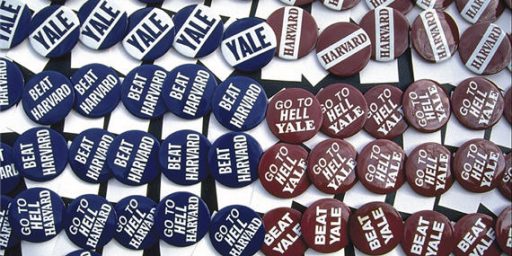Oh, Those Darn Meritocrats! (Just ask Ross Douthat)
So, was the financial crisis a result of too much meritocracy?
 Yesterday, Ross Douthat gave us a ridiculously lazy column (Our Reckless Meritocracy)which has a conclusion (and, for that matter, argument) worthy of a mediocre undergraduate essay.
Yesterday, Ross Douthat gave us a ridiculously lazy column (Our Reckless Meritocracy)which has a conclusion (and, for that matter, argument) worthy of a mediocre undergraduate essay.
Half of the column is an abbreviated biography of John Corzine’s rise and fall in the world of high finance. This then leads to him to assert:
By elevating the children of farmers and janitors as well as lawyers and stockbrokers, we’ve created what seems like the most capable, hardworking, high-I.Q. elite in all of human history.
And for the last 10 years, we’ve watched this same elite lead us off a cliff — mostly by being too smart for its own good.
All of this is, according to Douthat, allegedly “emblematic of our meritocratic era” wherein the cream that rises to the top is too smart by half and therefore takes bad risks that only smart people take (which begs the question: if they are so smart, why are they taking foolish risks?) and in so doing it would seem, threaten to bring down the global economy by their smartness. Apparently, smart people are also responsible for the failure in Viet Nam (for those of you keeping score at home).
He goes on to contrast this with the mistakes made by hereditary aristocracies (which “tend to flow from stupidity and pigheadedness”) and one-party states (which “flow from ideological mania”).
The thing is: the financial crisis was not the failure of “meritocracy” but rather it was the combination of bad decisions, greed, and lack of adequate oversight. It strikes me that Douthat’s focus on merit and high I.Q. is nothing but a dodge (or, more likely, an attempt at rationalization). But then again, I think that a lot of people are rationalizing the cases of the financial crisis, the response thereto, and its ongoing aftereffects because none of it fits into their existing worldview. It is especially problematic, I think, to accept the malfeasance of some in the financial sector if one believe that merit was, in fact, the driving force behind all success in said sector.
Douthat alludes that the column might actually be about a combination of a) an attempt to explain the appeal of the less than expert candidates in the GOP field, or b) a cautionary tale about what goes wrong when the conservative value of prudence is chucked out the window, but neither point is especially made (let alone well made) although you can kind of see them if you squint.
Perhaps instead of critiquing the meritocracy it is really a revelation about the Peter Principle and its manifestation at a certain major newspaper’s editorial page.
And in regards to his conclusion noted at the start of this post:
In place of reckless meritocrats, we don’t need feckless know-nothings. We need intelligent leaders with a sense of their own limits, experienced people whose lives have taught them caution. We still need the best and brightest, but we need them to have somehow learned humility along the way.
I concur with the first sentence (although think it would have been nice if the column had actually been about that topic) but find the rest to be pabulum of the type that I often read in essays written by students who couldn’t figure out how to end their paper. Because, dontcha know, what we need is smart people who will do the right thing and problem solved!






The point that I took from it is that the “best and the brightest” are not always so, if the present condition of the country is any indication. Going to Harvard, or any Ivy for that matter, does not guarantee that someone is any more capable than those that graduate from a lower tier school. Hell, for that matter, I know some very smart and successful people that never darkened the door of a college.
I don’t even take Douthat seriously enough to critique. Which is pretty bad because I have a high tolerance for reading pseudo-intellectual conservative nonsense.
He’s intellectually mushy. He’s one of those people that don’t need to be logically rigorous because he has faith and virtue on his side. What he says feels right to him and then the evidence flows from his conclusions.
There’s more famous and detrimental writers out there that do the same thing that I can focus on. Like David Brooks.
I don’t even bother to read Douthat, his column should have been given to Daniel Larison, He is even more intellectually lazy the David Brooks, he just lacks the tweed sport coat.
@Ron Beasley: Larison wold have been a much better choice, yes.
Douthat is not called Chunky David Brooks aka Chunky Bobo for nothing.
We need a death penalty for corporate managers whose greedy decisions damage society like China has.
@Steven L. Taylor: Of course Larison speaks truth to power -takes on the conventional “wisdom”, so it was never going to happen.
Clearly, I didn’t read the same column as you did. I took the message to be that “merit” is the same type of chimera as “breeding” or “intelligence” or “schooling” or many other things that we use to sort through who will be our “leaders” and “captains”–or in other situations, put people in their place. From that perspective, his cautionary tale is that the standards that we use to measure success are faulty. I would note that my take on the issue is that morality may be the missing element, but in our postmodern worldview, morality is just another “constructed reality,” and academics don’t generally like talking about it, so I’ll move on.
On Douthat, I will concede your point readily, but Douthat may also be representative of the same problem visiting the right that the left had a generation or two ago. At some point, leftist philosophy became so hidebound and orthodox that it became empty of reason, logic, and sensibility. This sea change gave conservatism the opportunity to come into some sort of ascendency that has lasted until now. We may be witnessing another pendulum swing.
I never heard of or read anything by Ross Douthat. However, after reading his column posted by Steven, it appeared to be an insightful piece .
For instance:
He’s has a point. Intellectuals tend to rely more on economic or computer climate models, theories, hypotheticals rather than experiential knowledge in arriving at their decisions and solutions. Basically they judge the world through their own brand of ‘facts’ or partisan-influenced science, oftentimes displacing wisdom or other pragmatic/relevant data in the process.
Also, his analysis of what the republicans are looking for in a representative candidate is spot on:
The key words in that excerpt are better instincts, as compared to poor or superficial ones.
Douthat goes on honestly to add:
Many of the comments posted below this thread reflect the premise being put forth in a book called, You Are Not So Smart, which explores and explains the human tendency for self-delusionment. The greatest self-delusion is labeled ‘confirmation bias.’ In essence this is when people think their opinions are tendered from objective analysis. The author, David McRaney, claims they are not, saying that, “It flavours our unbreakable belief that our behaviour follows from attitude, when actually our attitudes follow from our behaviours. We like to make up stories. But we’re unreliable narrators.” In other words people give validity to sources and sites which align with their own beliefs/politics, while discarding or invalidating those which don’t.
@jan:
Douthat isn’t talking about intellectuals though. I mean how could he. Douthat’s the private schooled Harvard kid that writes op eds for a living, not Corzine.
His example is a guy from “rural illinois” that went to a “state school” and joined the marines. Douthat’s literally railing against achievement as a measure of a person. Not against “intellectualism.” That’s why he uses the word “meritocrats.”
The intellectual angle is just you trying to spin Douthat’s nonsense into something that fits what you think might be logical. A common mistake when reading people like Douthat. Sometimes people just write stupid things. Leave it at that.
Didn’t we recently have a president who was a hereditary aristocrat?
Douthat did not say that meritocracy caused the crash of 2008, but that very bright people helped to create that. To be sincere, I think that one of the reasons that Lula – that barely finish Elementary Schooll – was a better president than his predecessor – a worldwide Sociology scholar – was precisely because he knew his limitations. Fernando Henrique Cardoso did not.
@André Kenji de Sousa:
Of course he didn’t say meritocracy caused the crash of 2008. That would require using things other than platitudes, innuendo, and “intuition.”
@Console:
I hope you’ll hang around here. Very smart. And you have some philosophy in your background.
@michael reynolds:
Only a few undergrad classes. But enough to be able to rant about the pundits I can’t stand.
@jan:
So, “instincts” are how you want the most powerful country in the world to be run?
Really?
Didn’t we try that recently?
Do we have a “meritocracy”? I think it’s more like a “plausible deniabilitocracy”. The same basic idea as the old wisecrack that “nobody ever got fired for recommending IBM” (now I guess it’s Microsoft)?
The failure of the financial system had nothing to do with meritocracy and everything to do with hubris. And don’t blame it on the quants, either. I’m certain that every CDO that was put together by the mathematicians in the back room came with 20 pages of stated assumptions, explanation, and caveats. The rating guys simply snipped off all the warnings, slapped “AAA” on the beast, and whisked it out to the sales barkers.
Is Douthat admitting that he didn’t earn his column through merit? Because his entire list of qualifications (just like Matt Yglesias) is that he graduated from Harvard.
This meme is at least as old as David Halberstam’s 1972 classic “The Best and the Brightest.” Indeed, that’s presumably where Douthat’s Vietnam illusion comes from.
@Steven L. Taylor:
Reading Douthat so that we don’t have to.
@Console:
Reading Jan so that we don’t have to.
As I’ve mentioned, I like this as an alternate narrative:
Ending The Divine Right of Bankers
I’ve heard Douthat on Bloggingheads and found him fine in conversation. It wouldn’t surprise thought that he’d write a “what good can I say about Wall St.” piece, absent that give and take.
Describing this piece as lazy is very charitable of you Steven. It implies Douthat can do better, which we all know he can’t.
So what we have is the problem that in the modern world, the “elite” as it were are more than likely never to have put in a days work in the production of real output, be it in the useful arts or farming.
But our real problem is that these “masters of the universe” cover for each other and pawn off accountability and responsibility to the taxpayer or others all in the name of the brand. These meritocrats seem to fear that if one is shown to be less than the best of the best, they all very well might not be. So they live in denial and it is only rarely that one blows up so bad as to be undeniable.
I wonder if Douthat even realizes the incredible snobbery and aristocratic arrogance in this statement. “The children of poor people, no matter how smart, just can’t do things right”.
The clear implication is only those born into privilege and power have sufficient wisdom to run things and those working their way up simply don’t qualify to join them, but could perhaps serve in some meaningful way.
Douthat is literally advocating a strict class-based system in is country, where some are born to rule and others born to obey.
Jan, I’m curious how you know this? Has this been studied and proven? You state it as a given, but it certainly does not match my intuition about the world. My intuition says smart people make better choices and are more likely to consider all the available information before deciding. But I’m willing to be persuaded if there is evidence to support your view.
The basic problem of meritocracy is that you’ve got to define what qualifies as “merit”.
Mike
Jan…the queen of giving validity to sources and sites which align with her own beliefs/politics, while discarding or invalidating those which don’t…supports Douthat by validating his conclusions…which of course align with her own beliefs/politics.
qtip…
Jan believes that
because otherwise she would be forced to accept the overwhelming scientific consensus on AGW. So instead she discards and invalidates the overwhelming scientific consensus, while giving validity to sources and sites which align with her own beliefs/politics. So pretty much what she accuses everyone else of doing…but lacks the self-knowledge to see in herself.
Hmm. Most of the people I have known that qualify as belonging to “the elite” got there in large part because of extraordinarily hard work. High intelligence and/or talent also figure in heavily. And they tend to produce quite a bit in the way of real output.
Why all the success envy from the right?
Actually Jan, intellectuals know when to use a model, while understanding the limitations.
Related:
The downside of the beauty of physics
@JKB:
Your reply seems to conflate “the elite” with “the meritocracy”, but it seems like they aren’t the same. There certainly exists in the US a near-hereditary elite who exist outside our mundane relaity, but they arguably are the antithesis of a meritocracy, because they haven’t earned anything.
Why conflate them?
@jan:
First, what you call “experiential knowledge” is, in the sicentific world, known as “data” or “empirical observation”; And no theory is accepted in science unless it has empirical observation to back it up (e.g.- do we have first-hand observation of temperatures rising or not?)
The scientific world relies on facts, not “facts”.
The whole point of the scientific method of making theories and testing them with observable data was meant to sweep away the medieval reliance on theology and untestable logic arguments.
When you treat facts as “facts”, and equate measurable data with “wisdom” you revert to that world of alchemy where everything and anything is possible, if one has enough gravitas and intuitive hunches and bullshit to convince the mob.
As for Douthat, it isn’t surprising he draws non sequitur conclusions since he starts from incorrect assumptions- he frames the argument as pitting meritocrats against aristocrats. But in both cases when allowed to run unsupervised and unchecked, they end in disaster. Wouldn’t it be better to see the problem as a lack of supervision and accountability?
No, because then that would lead to a conclusion he dislikes.
@Liberty60:
It is the worst sort of failure to reserve the right to reject any answer you don’t like, but it seems a part of the right-evangelical value system.
They don’t like “science” because it doesn’t allow them that flexibility.
@Liberty60:
While you supply a thoughtful argument, it doesn’t take into account some of the human ‘hubris’ often involved with directional decisions being made by the leaders of the pack.
These leaders of our country think they know best, so put into practice policies that are out of reach from the very supervision and accountability you so reasonably cite as being a big part of our problems. Some of the programs, for instance, put into place by Obama, trying to intervene in home mortgages and car sales, were done by people having no real knowledge of these sectors. Even Obama’s American Job’s Plan is more theorically than pragmatically created.
This was especially true in the Cash for Clunkers debacle. Where was there any hands-on ‘experiential’ leadership in these policies? It was mostly created by ‘intellectual’ speculation rather than consulting with people having experience and expertise in these areas. For instance, John Campbell – R, representing the 45-CD in CA, ran car dealerships before entering politics. He would have been someone to bring on board as a consultant when considering the merits and consequences of the Cash for Clunkers policy.
Now,Obama, IMO, is exacerbating the problems more, of not having enough oversight or supervision, by using the EO more frequently, along with more strident rhetoric threatening to find ways of bypassing Congress’s involvement in policy-making. This is becoming a ‘Lone Ranger” President, who basically is attempting to orchestrate a unilaterally run government as a way of circumventing any opposition to his agenda.
This is the kind of imperialistic behavior I believe was denoted in Douthat’s column. His was an examination of the intellectual elite occupying the WH now. His conclusion was that this is the type of figure the public is turning away from, in their search for an honest political broker, who also has outside the beltway experience and common sense added into their resume.
@jan:
You are making the same fallacy that Douthat makes.
You pit Obama’s “intellectual elite” against “common sense”.
If the Unitary Executive is empowered to do anything he wishes via Executive Order, what difference will it make if he is using intellectual prowess or common sense?
Both will end in disaster. isn’t this why the Founders set up the three branches of government to act as a check on each other?
You prefer John Cambell’s auto experience over Obama’s intellectual theory; but when we apply that same thinking to the Treasury Department, don’t we get the same incestuous revolving door that gave us Bernanke/ Paulson/ Geithner, where those with “common sense” and “practical real world knowledge” in banking were invited to determine economic policy?
Again, there isn’t any special magic type of knowledge that allows us to give unchecked power to our political leaders. All humans are fallible and need to be held in check by vigilance and regulation.
@jan:
Words fail me.
@Rick Almeida:
I was unclear. What I see as a part of the problem is that those in these positions have little experience with work or effort in the, let’s say, manual world. In the past, those who rose to through merit had grown up on a farm, or worked in a factory or by the end of WWII or Korea, served in the military. But more and more of the “best and brightest” further down the economic chain are graduating with advanced degree never having swept a floor or created anything outside the abstract. This lack of the humbling experience of taking something from mind to matter creates the circumstance of self delusion. As we see, many are given control over vast resources and fail to understand the limits.
Much of what happened with the mortgage disaster were the young came in, never having experienced the bad, started believe they had outsmarted it and nothing could go wrong so more disastrous bets were made till it all went bad. And yes, many of the old guys went along but when the bets keep paying off, everybody jumps on the line, but the past isn’t a predictor of the future performance.
@jan:
Which is, of course, why the Bush tax cuts were allowed to expire, the president was able to get a clean increase of the debt ceiling without strings, and why his job bill has been implemented (to name but three examples).
Seriously, one need not be a supporter of the president to see that he (like all others in that office) cannot act as “Lone Ranger”–indeed, this is empirically the case and why I constantly write in many of my posts about the institutional parameters that constraint presidents.
Poor Jan…denying facts that don’t fit in with her beliefs again…
“…This is becoming a ‘Lone Ranger” President, who basically is attempting to orchestrate a unilaterally run government as a way of circumventing any opposition to his agenda…”
First – George Bush issued almost 300 EO’s…4 times Obama’s. That’s far more than any other President. I think that makes him the “Lone Ranger”…except he wears a flight suit with a codpiece…and he is afraid of horses.
Second – If so-called republicans voted for things they actually support, instead of obstructing for the sake of obstructing and intentionally working to damage the economy, Obama’s small number of EO’s would be be even smaller.
Refute all you want, guys. She will be back spouting another round of talking points, without any reference to the rebuttal of her incorrect claims.
This is why engaging her is pointless. You can point out the EO thing is BS. Meanwhile, she’ll just move on and make more claims. You will debunk them, judiciously as you will, and she will pontificate again…
@JKB:
Thanks for your thoughtful reply. Not much to disagree with there.
@ Rob…
I think the proper term is Jantificate.
@jan: What was your problem with the Cash for Clunkers program? Most reports indicate it was a success.
@ David M…
You have to remember that the wingnuts were more than willing to watch the auto industry implode right in the middle of the worst contraction since the Depression. It’s part and parcel with intentionally holding back the economy for political gain.
@jan:
You know, Jan, you get more fatuous as time goes on here at OTB. Campbell was a big supporter of the Cash for Clunkers program.
@David M:
I didn’t like Cash for Clunkers, though not because the goal or achievement were bad. It was just at too high a cost. We are softies. We only try to bribe ourselves to better behavior with the carrot, and never use the stick.
In this case the stick would be a gasoline tax. It would have moved fleet mileage, force some car-switching, and reduced the deficit.
Of course, the “right” wouldn’t have gone for it, because they aren’t for “user fees,” they are for free gas, for everyone.
@David M:
The program was ‘popular,’ very popular, and seemed to indicate (at least at the onset) a revitalization of the car industry, by creating more sales, instantly. Yes, Sam, John Campbell was one of the few republicans who supported this policy. However, he was not engaged in the initial formulation behind this stimulus program, which is the only reference I made.
As for what was wrong with the program, it has become more self-evident as time has gone on. Here is one piece on it, as well as another analysis of the program’s ultimate effects on the economy:
A look at this program showed that 45% of the participants would have bought new cars even if this program hadn’t been in place. Also, there was relatively little change in gas milage as reflected in one of the goals being to have more fuel-efficient cars on the road.
Even Austan Goolsbee recently chimed in publically saying that “In short, the program didn’t encourage people to buy new cars…”
@jan:
For this to change, you’d have to have had a much larger program, so it’s possibly the least thought out complaint ever. For the vehicles included, yes there was a fairly significant improvement in fuel economy.
Also, has everyone forgotten that the auto industry was actually in trouble in 2009? Even just clearing excess inventory sooner was definitely a positive impact.
“Debacle”? You keep using that word. I do not think it means what you think it means.